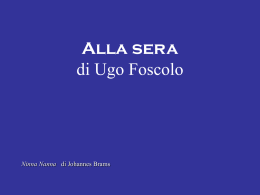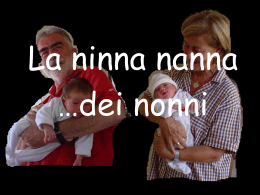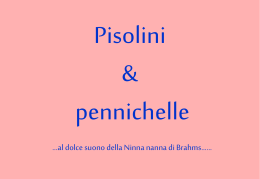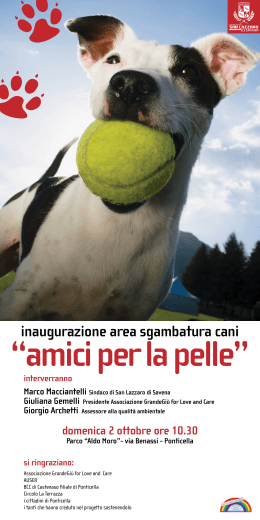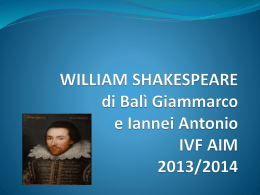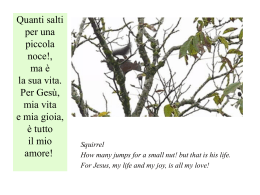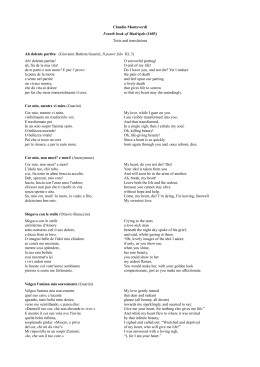Claudio MONTEVERDI Se i languidi miei sguardi (Lettera amorosa a voce sola in genere rappresentativo) (Madrigali guerrieri e amorosi Libro VII, Venezia, Bartolomeo Magni, 1619) Claudio MONTEVERDI Se i languidi miei sguardi (Lettera amorosa a voce sola in genere rappresentativo) (Madrigali guerrieri e amorosi Libro VII, Venezia, Bartolomeo Magni, 1619) Se i languidi miei sguardi, se i sospiri interrotti, se le tronche parole non han sin or potuto, o bell’idolo mio, farvi delle mie fiamme intera fede, leggete queste note, credete a questa carta, a questa carta in cui sotto forma d’inchiostro il cor stillai. Qui sotto scorgerete quegl’interni pensieri che con passi d’amore scorron l’anima mia; anzi, avvampar vedrete come in sua propria sfera nelle vostre bellezze il foco mio. If my languishing looks, if my unfinished words, have not yet, oh my life, proved my passion, read these notes, believe this letter, in this letter in which like the ink, my heart bled. There you shall see the secret thoughts that with loving gait wander in my soul; so, shall you see burn as in its own sphere, by your beauty, my fire. Non è già parte in voi che con forza invisibile d’amore tutto a sè non mi tragga: altro già non son io che di vostra beltà preda e trofeo. A voi mi volgo, o chiome, cari miei lacci d’oro: deh, come mai potea scampar sicuro se come lacci l’anima legaste, come oro la compraste? Voi, pur voi dunque siete della mia libertà catena e prezzo. Stami miei preziosi, bionde fila divine, con voi l’eterna Parca sovra il fuso fatal mia vita torce. There is nothing in you that does not drag me with the invisible power of love: I am nothing more than prey and prize of your beauty. To you I turn, oh, hair, beloved braids of gold: ah, how shall I escape if you have tied my soul like a plait, and bought it like gold? You, for you are the chain and the price of my freedom. My jewels, fair divine twine, you are used by eternal Parca on her fatal spindle, weaving of my life. Voi, voi capelli d’oro, voi pur siete di lei, ch’è tutta il foco mio, raggi e faville; ma, se faville siete, onde avvien che ad ogn’ora contro l’uso del foco in giù scendete? Ah che a voi per salir scender conviene, ché la magion celeste ove aspirate, o sfera de gli ardori, o paradiso, è posta in quel bel viso. You, you braids of gold, you belong to she, who is all my fire, my rays and lightning; for, if lightning you are, why unlike fire, do you descend? Ah, you need descend to go up, the high heaven that you yearn for, oh, sphere of passion, oh, paradise, lives in that radiant face. Cara mia selva d’oro, ricchissimi capelli, in voi quel labirinto Amor intesse onde uscir non saprà l’anima mia. Tronchi pur morte i rami del prezioso bosco e da la fragil carne scuota pur lo mio spirto, che tra fronde sì belle, anco recise, rimarrò prigioniero, fatto gelida polve ed ombra ignuda. My beloved forest of gold, finest braids, in you Love wove a labyrinth where the soul is lost. Can death cut the branches of the lovely wood, and from delicate flesh free my spirit, but in such a beautiful, yet pruned, canopy, I shall remain captive, made cold dust and knotted shadow. Dolcissimi legami, belle mie piogge d’oro Sweetest twine, my beautiful golden rain quali or sciolte cadete da quelle ricche nubi onde raccolte siete e, cadendo, formate preziose procelle onde con onde d’or bagnando andate scogli di latte e rivi d’alabastro, more subitamente (o miracolo eterno d’amoroso desìo) fra si belle tempeste arse il cor mio. each drop falling from those rich clouds that hold you and, in falling, you make pretty storms and break waves and waves of gold, swiftly shaded, in crags of milk and rivers of alabaster (oh, eternal miracle of loving desire), in those beautiful storms my heart was burnt. Ma già l’ora m’invita, o degli affetti miei nunzia fedele, cara carta amorosa, che dalla penna ti divida omai; vanne, e s’amor e’l cielo cortese ti concede che de’ begli occhi non t’accenda il raggio, ricovra entro il bel seno: chi sà che tu non gionga da sì felice loco per sentieri di neve a un cor di foco! But now the hour bids me, oh, faithful messenger of my affection, precious love letter, to separate my quill from you; go, and if love and the courteous sky prevent the rays of her eyes from burning you, find shelter in her lovely breast: that per chance you reach out from such a blessed place, across snow-covered paths to a heart of fire. Claudio Achillini Claudio Achillini Tarquinio MERULA (1594 – 1665) Hor ch’è tempo di dormire (Canzonetta spirituale sopra la Nanna) Curtio precipitato et altri capricii, Venezia, Bartolomeo Magni, 1638) Tarquinio MERULA (1594 – 1665) Hor ch’è tempo di dormire (Canzonetta spirituale sopra la Nanna) Curtio precipitato et altri capricii, Venezia, Bartolomeo Magni, 1638) Hor ch’è tempo di dormire Dormi dormi figlio e non vagire, Perchè, tempo ancor verrà Che vagir bisognerà Deh ben mio deh cor mio Fa, Fa la ninna ninna na Now that it is time to sleep, sleep, son, and don’t’ cry; for the time will come soon enough when crying is needed. O my dearest, my heart; lullaby and sleep now. Chiudi, quei lumi divini Come fan gl’altri bambini, Perchè tosto oscuro velo Priverà di lume il cielo Deh ben mio deh cor mio Fa, Fa la ninna ninna na Close those divine eyes as other babies do; for soonb a dark veil will deprive the sky of light O my dearest, my heart; lullaby and sleep now. Over prendi questo latte Dalle mie mammelle intatte Perchè ministro crudele Ti prepara aceto e fiele Deh ben mio deh cor mio Fa, Fa la ninna ninna na Or take this milk From my immaculate breasts; for a cruel magistrate is preparing vinegar and gall for you. O my dearest, my heart; lullaby and sleep now. Amor mio sia questo petto Hor per te morbido letto Pria che rendi ad alta voce L’alma al Padre su la croce Deh ben mio deh cor mio Fa, Fa la ninna ninna na My love, let this breast be now a soft bed for you, before, with a loud voice, you give your soul to the Father, on the cross. O my dearest, my heart; lullaby and sleep now. Posa hor queste membra belle Vezzosette e tenerelle Perchè poi ferri e catene Rest your beautiful small limbs, so charming and delicate; for later, irons and chains Gli daran acerbe pene Deh ben mio deh cor mio Fa, Fa la ninna ninna na will cause them bitter pains. O my dearest, my heart; lullaby and sleep now. Queste mani e questi piedi Ch’or con gusto e gaudio vedi Ahimè com’in varij modi Passeran acuti chiodi These hands and feet which now you behold with zest and joyalas in how many ways will sharp nails pierce them! Questa faccia gratiosa Rubiconda hor più di rosa Sputi e schiaffi sporcheranno Con tormento e grand’affano Ah con quanto tuo dolore Sola speme del mio core Questo capo e questi crini Passeran acuti spini This graceful face, ruddier than a rose spitting and slaps will defile it with torture and great suffering. Ah, with how much pain for you, O only hope of my heart, this head and this brow will be pierced by sharp thorns. Ah ch’in questo divin petto Amor mio dolce diletto Vi farà piaga mortale Empia lancia e disleale For this divine breast, O my sweet and delightful love, an impious traitorous spear will make a mort wound. Dormi dunque figliol mio Dormi pur redentor mio Perchè poi con lieto viso Ci vedrem in Paradiso Sleep, therefore, my son, sleep then, my Savior; for later with joyful faces we’ll see each other in Paradise. Hor che dorme la mia vita Del mio cor gioia compita Taccia ognun con puro zelo Taccian sin la terra e’l Cielo Now that you are sleeping, O my life O complete joy of my heart, let all be quiet with pure zeal, even the earth and the heavens. E fra tanto io che farò Il mio ben contemplerò Ne starò col capo chino Sin che dorme il mio Bambino Meanwhile, what shall I do? I will watch my dear, not letting my head bow as long as my baby sleeps. Autore anonimo Anonymous author Luigi ROSSI (ca. 1597 – 1653) Mio ben (Orfeo, 1647) Luigi ROSSI (ca. 1597 – 1653) Mio ben (Orfeo, 1647) Mio ben teco il tormento più dolce io troverei, Che con altrui il contento, Ogni dolcezza è sol dove tu sei. E per me, amor Aduna, Nel girar de’ tuoi sguardi ogni fortuna. My love, in you torment sweeter I would find than in other happiness, all sweetness is only where you are, and for me Love gathers in the turning of your glances all fortune. Testo di Francesco Buti Lyrics by Francesco Buti Barbara STROZZI (1619 – 1677) Lagrime mie (Diporti di Euterpe ovvero Cantate e ariette a voce sola, op.7 Venezia, Bartolomeo Magni, 1659 Lagrime mie, à che vi trattenete, Perchè non isfogate il fier’ dolore, Chi mi toglie’l respiro e opprime il core? Barbara STROZZI (1619 – 1677) Lagrime mie (Diporti di Euterpe ovvero Cantate e ariette a voce sola, op.7 Venezia, Bartolomeo Magni, 1659 Tears of mine, why do you hold back, why don’t you wash away the pain which takes my breath and crushes my heart? Lidia, che tant’ adoro, Perchè un guardo pietoso, ahimè, mi donò I paterno rigor l’impriggionò. Tra due mura rinchiussa stà la bella innocente, Dove giunger non può raggio di sole, E quel che più mi duole Ed accresc’il mio mal, tormenti e pene, È che per mia cagione prova male il mio bene E voi lume dolenti non piangete! Lagrime mie, à che vi trattenete? Lidia, whom I adore, Because she gave me a pitying glance, Has been imprisoned by her severe father. The innocent girl is locked up within walls Which the sun’s rays cannot penetrate, And what pains me most, And increases my torment, Is that I am the cause of my beloved’s suffering. And you, my eyes, are not weeping! Tears of mine, why do you hold back? Lidia, ahimè, veggo mancarmi, l’idol mio, Che tanto adoro! Stà colei tra duri marmi per cui spiro E pur non moro. Se la morte m’è gradita, Or che son privo di spene, Dhè, toglietemi la vita (Ve ne prego) aspre mie pene! Ma ben m’accorgo, che per tormentarmi maggiormente, La sorte mi niega anco la morte. Se dunque è vero, o Dio, che sol del pianto mio. Il rio destino ha sete. Alas, how I miss my Lidia, my idol, I love so much! She is shut up within marble walls and I sigh but I do not die! If death might be granted to me now that I have no hope, take my life, (I beg of you) oh my sufferings! But I am well aware that in order to torture me even more. Fate even denies me death, it is true then, oh God, that destiny desires only my tears. Testo di Pietro Dolfino Lyrics by Pietro Dolfino Barbara STROZZI (1619 – 1677) Udite amanti - L’Eraclito amoroso (Cantate, arie e duetti Op. 2, Venezia, Angelo Gardano, 1651) Barbara STROZZI (1619 – 1677) Udite amanti - L’Eraclito amoroso (Cantate, arie e duetti Op. 2, Venezia, Angelo Gardano, 1651) Udite amanti la cagione, oh Dio, ch'a lagrimar mi porta: nell'adorato e bello idolo mio, che sì fido credei, la fede è morta. Listen, you lovers, to the reason - oh God! for my weeping: in my adored and beautiful idol, who I believed to be faithful, faith is dead. Vaghezza ho sol di piangere, mi pasco sol di lagrime, il duolo è mia delizia e son miei gioie i gemiti. I find charm only in weeping, I nourish myself by my tears, grief is my delightand my moans are my joy. Ogni martie aggradami, ogni dolor dilettami, i singulti mi sanano, i sospir mi consolano. Every anguish pleases me, every sadness is my delight, my sobs heal me, and my sighs console me. Ma se la fede negami quell'incostante e perfido, almen fede serbatemi sino alla morte, o lagrime! But if he denies faith, he who is fickle and treacherous, at least faithfully serve meuntil death, oh my sorrow! Ogni tristezza assalgami, ogni cordoglio eternisi, tanto ogni male affliggami che m'uccida e sotterrimi. Every tear sooths me, all my mourning lasts for ever, so much does each ill afflict met hat it kills and buries me. Stefano LANDI (1587 – 1639) Alla guerra d’amor (Quinto libro delle arie, Venezia, Bartolomeo Magni, 1637) Stefano LANDI (1587 – 1639) Alla guerra d’amor (Quinto libro delle arie, Venezia, Bartolomeo Magni, 1637) Alla guerra d'amor correte Amanti: non più sospiri, On più martiri. Alla guerra d'mor, all'armi, all'armi. Aita, aita, il mio core se'n và, la mia vita dov'è? Ah! cruda partita: Pietà! To the wars of lovehasten o Lovers: no more sighing, no moer torments. To the wars of love, to arms, to arms. Help, help, my heart is leaving me! Wher is my life? Ah! Cruel parting: Mercy! Autore anonimo Anonymous author Claudio MONTEVERDI Sì dolce è ’l tormento (C. Milanuzzi: Quarto scherzo delle ariose vaghezze, Venezia, Alessandro Vincenti, 1624) Claudio MONTEVERDI Sì dolce è ’l tormento (C. Milanuzzi: Quarto scherzo delle ariose vaghezze, Venezia, Alessandro Vincenti, 1624) Si dolce è’l tormento Ch’in seno mi sta, Ch’io vivo contento Per cruda beltà. Nel ciel di bellezza S’accreschi fierezza Et manchi pietà: Che sempre qual scoglio All’onda d’orgoglio Mia fede sarà. So sweet is the torment that lies in my heart, that I live happily because of its cruel beauty. May beauty's fury grow wide in the sky without compassion; for my devotion shall hold like a rock against pride's unrelenting wave. La speme fallace Rivolgam’ il piè. Diletto ne pace Non scendano a me. E l’empia ch’adoro Mi nieghi ristoro Di buona mercè: Tra doglia infinita, Tra speme tradita Vivrà la mia fè. False hope, keep me wandering! let no peace nor pleasure befall me! Evil woman, whom I adore, deny me the rest that compassion would give; amidst infinite pain, amidst broken hopes shall survive my devotion. Per foco e per gelo Riposo non hò. Nel porto del Cielo Riposo haverò. Se colpo mortale Con rigido strale Il cor m’impiagò, Cangiando mia sorte Col dardo di morte Il cor sanerò. There is no rest for me in the warmth or the cold. Only in heaven shall I find rest. If the deadly strike of an arrow injured my heart, I shall heal still, and change my destiny, death's very heart with the same arrow. Se fiamma d’amore Già mai non sentì Quel riggido core Ch’il cor mi rapì, Se nega pietate La cruda beltate Che l’alma invaghì: Ben fia che dolente, Pentita e languente Sospirimi un dì. If the frigid heart that stole mine never has felt love's ardour; if the cruel beauty that charmed my soul denies me compassion, may she die one day by me pained, repenting, languishing. Lyrics by Carlo Milanuzzi Lyrics by Carlo Milanuzzi
Scaricare
